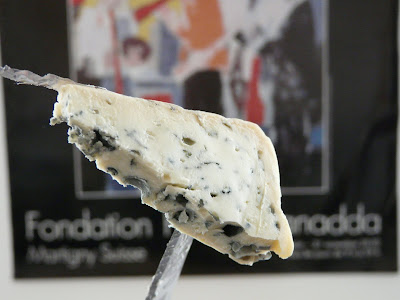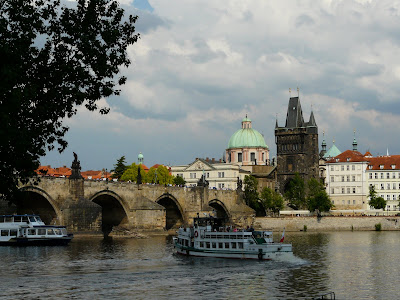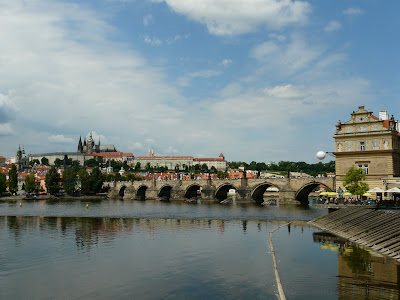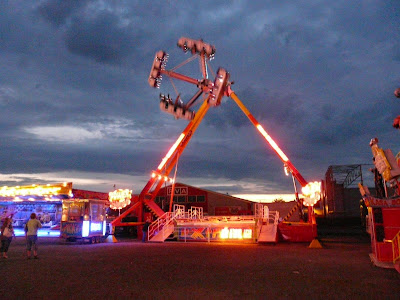To celebrate our very first wedding anniversary, we decided to take a special trip to a city we've always wanted to visit. It was hard to narrow down the choices, however. Edinburgh, Copenhagen and Seville were all enticing choices. But looking at the map of places we've visited this year, we realized we've made it to the United Kingdom, Scandinavia, northern Africa, and Western Europe. What was really missing was an exploration of Eastern Europe. With lots of advice and recommendations from friends and family, we knew that Prague would be a beautiful place to celebrate our anniversary.
 |
| We kicked off our weekend with a nice, long walk through the city, scoping out what we'd like to explore further. | |
 |
| The architecturally fascinating "Dancing House" |
Heading into the Stare Mesto, or "Old Town" we noticed a Czech love for marionettes and saw stores selling them all over the city.
The old city square is a beautiful, yet more touristy area. Here we found the famous tower displaying the "Astronomical Clock".

 |
| The Astronomical Clock |
Climbing to the top of this tower we were just in time to see a man dressed in Medieval period costume to come to the window and blow his trumpet announcing that noon had arrived. The crowd below was enticed, and we later found out that our HEC friend Esther had been down below. She must be somewhere in this picture.
 |
| The Church of Our Lady Before Tyn is an eye-catching sight. |
The next day we crossed the Vlatva River exploring the other side of the Charles Bridge, which s a not-to-be-missed attraction in its own right. The picture above is of the Lesser Town Bridge Tower at the end of the bridge, leading the crowds into the Lesser Town, or Mala Strana. In the Mala Strana we headed towards Prague Castle, also known as Lobkowicz Palace.
 |
| On the Charles Bridge |
|
From the top of the hill at Prague Castle we had a beautiful view of the city. The green dome of St. Nicholas church is particularly captivating, and we had a chance to visit it later. Lobkowitz Palace houses some incredible national treasures, most amazing of which are original handwritten musical scores written by Beethoven and Mozart. We also had the opportunity to see a musical trio perform in the original entertaining hall of the palace. Upon exiting the palace, we took a quick stop to see the oldest vineyard still in Prague.
 |
| St. George's Basilica-Prague's best preserved Romanesque Church |
|
St. Vitus Church in Prague Castle's complex is a remarkable church with impressive stained glass windows. The windows in the picture really caught our attention and I took many pictures. We had never seen stained glass that looked so artistic and original. On our last day we visited a museum dedicated to the Art Nouveau artist Alphonse Mucha.
The top of the hill where Prague Castle sits is also home to a small vineyard where tourists can stop for a break and enjoy a glass of local wine or a piece of traditional Czech cinnamon bread which is baked into a hollow cylindrical shape and served warm.
 |
| The view of Petrin Tower on Petrin Hill |
The view from the castle was beautiful, and we could see Petrin Hill. What's that up on top? Are we back in Paris? No, it was Prague's mini Eiffel Tower, known as Petrin Tower, which offers amazing views. After our visit to the Castle, we headed towards Petrin Hill. We decided against taking the funicular up to the top and instead hiked it by foot. The views along the way were gorgeous and we just couldn't wait to climb to the top of the tower to see the whole of the city. However, upon arrival, there was a long line to enter the tower and more money to be spent, so we skipped the climb and spent some time exploring the gardens atop Petrin Hill instead.
 |
| A living lawnmower taking a break from his duties of providing little children with rides. |
Back down the hill, we headed to St. Nicholas Church in the Lesser Town Square. It was one of the most ornate churches we've seen in Europe.
 |
We had to do a double-take here...
What exactly is that man saying to the little cherub? | | |
|
|
|
On one beautiful afternoon, we took a stroll through a park and stumbled upon an incredible outdoor exhibit called "Winton's Trains" which commemorated the 669 Jewish children that were evacuated out of Czechoslovakia during WWII on trains and sent to safety in London. The photographs were quite moving and the exhibit was a real reminder that visiting any city is just as much about the people and their history as it is about celebrating food, art and architecture.
 |
| Some of the survivors came back for the 60th anniversary of Winton's Trains to take the three-day journey to London once again. |
The rest of our weekend included explorations of art, architecture and cuisine.
 |
| Our stop at the Mucha Museum to learn about the Art Nouveau style |
 |
| The Municipal House is Prague's finest Art Nouveau building. |
 |
| Some interesting (and creepy) sculptures |
|
 |
| The Peace Wall, dedicated to John Lennon, which is free to all graffiti artists. |
 |
| One of our favorite activities when traveling is to check out the local grocery stores. We sampled the "Schoko Bananen" which were not very good. |
|
 |
| Other food adventures were more successful, like beer, weinerschnitzel and sausage, a few of the local specialties. |
Since we were very interested in exploring local food and drink, we headed to the Czech Beer Festival! It was a cross between the North Mianus Pow Wow yearly fair and a mini-version of Oktoberfest. Since we'll be heading to Munich in the fall for that famous German beer festival, we figured this one would be a good warm-up.
 |
| And we finally did catch up with our HEC friend, Esther, who was in Prague the same weekend! |
 |
| We even made some new friends, Luke and Lindy from L.A. |
 |
| Pork Knee |
 |
| Apple strudel or plum pie? |
|
 |
| And no Czech beer festival would be complete with a stout man playing the trumpet at the tables, a flying sausage, and a truck with a keg in the back! The live band playing '80s classics didn't hurt, either! |
 |
| "Happy Anniversary!" |











































































